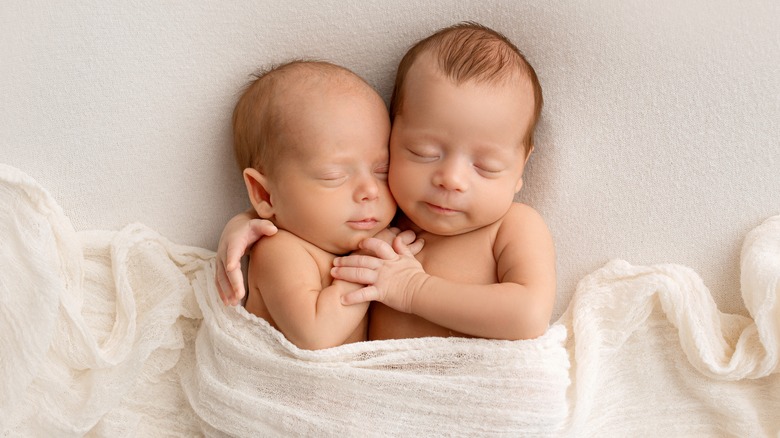What Are The Chances Of Having Multiple Babies If You Use IVF?
IVF stands for in vitro fertilization and according to Planned Parenthood, it is one of the most popular methods of assisted fertilization and works by helping the sperm fertilize the egg, which is then implanted into the uterus. IVF, while effective, can be extremely time consuming and expensive, per Mayo Clinic. Many people believe that infertility is the sole reason for the use of IVF, but those who have genetic disorders, ovulation disorders, a blockage in the fallopian tubes, or even are over the age of 40 may also opt to undergo IVF.
While there is no guarantee of pregnancy when undergoing IVF, it is still the most successful form of assisted reproductive technology. According to The Fertility Institute, IVF is a safe process that when done correctly, can result in a beautiful new baby. But, as with any procedure, there is a risk of side effects. One of the biggest side effects of IVF is having multiples — but what are the chances of this actually happening?
Having multiples amid IVF is fairly common
According to the CDC, multiple births is a common occurrence when it comes to fertility treatments. In fact, over the last 40 years, the number of births that resulted in more than one baby has doubled — a direct correlation to the increase in IVF treatments. Research done by the CDC proved that about 43% of IVF births resulted in twins, while 3% resulted in triplets or more. When it comes to all births, whether naturally or through assistance, this data has proven that IVF and similar methods have resulted in about 50% of twin births and 75% of triples, quadruplets, and more, per The Fertility Institute.
Those percentages are a bit surprising, but if you are about to undergo IVF, or considering it as an option, you don't need to worry too much about having multiples. According to Mayo Clinic, you would need to transfer more than one embryo for the chance of twins to occur. This can be a popular option due to the difficult process of IVF and the expense, but it also comes with more risks than just the high chance of having twins. Speak with your doctor about your options when it comes to embryo transfer before choosing this option.
Risks that occur with multiples
Having twins, especially after experiencing infertility, may sound like a dream occurrence for many parents-to-be. And while having twins through IVF is common and mostly safe, there are a lot of risks that come with multiples, both in pregnancy and in birth.
According to John Hopkins Medicine, the biggest risks associated with multiples during pregnancy is anemia in the mother, along with gestational hypertension (high blood pressure), and miscarriage — of which there is more fear and uncertainty surrounding now than ever, given the reversal of Roe v. Wade. During delivery, multiples pose a higher risk for preterm labor and preterm birth and the chance of having a c-section also increases. Birth defects such as spina bifida and heart defects are also more common in twins and multiples.
While it's important to know all the risks associated with IVF, the procedure is generally very safe if done correctly and by a trusted medical professional. According to the Human Fertilisation and Embryology Authority, most women who undergo IVF go on to have a healthy pregnancy, birth, and baby.


